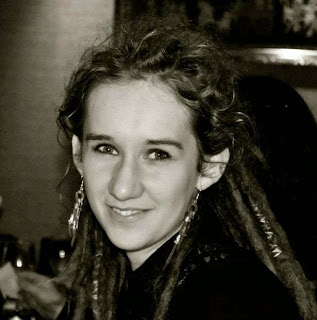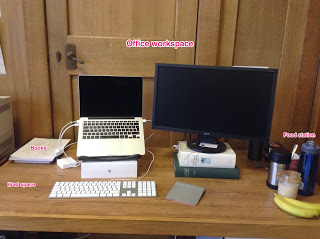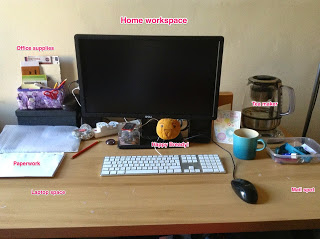I am Gabriela Hajduk and This is How I Work
 Today, I am interviewing Gabriela Hajduk in the “This is How I Work” series. Gabriela has a background in behavioral ecology. She has done her undergraduate degree with integrated masters year at the University of Sheffield (MBiolSci in Animal Behavior, graduated summer 2014). Her masters year project focused on the mechanisms of sperm storage in avian female reproductive tract. She is currently pursuing a PhD in evolutionary ecology at the University of Edinburgh. Birds are her preferred study organism and she has a particular interest in the genetic and evolutionary basis of their reproductive and social behaviours. Beyond that she has a wider interest in wildlife conservation and animal welfare, as well as science communication and the challenges faced by minorities in science and academia. In her free time she enjoys the great outdoors and is a keen rock climber, when at home she enjoys drawing, as well as food-related things. Follow her on Twitter @AmidstScience and/or check out her blog.
Today, I am interviewing Gabriela Hajduk in the “This is How I Work” series. Gabriela has a background in behavioral ecology. She has done her undergraduate degree with integrated masters year at the University of Sheffield (MBiolSci in Animal Behavior, graduated summer 2014). Her masters year project focused on the mechanisms of sperm storage in avian female reproductive tract. She is currently pursuing a PhD in evolutionary ecology at the University of Edinburgh. Birds are her preferred study organism and she has a particular interest in the genetic and evolutionary basis of their reproductive and social behaviours. Beyond that she has a wider interest in wildlife conservation and animal welfare, as well as science communication and the challenges faced by minorities in science and academia. In her free time she enjoys the great outdoors and is a keen rock climber, when at home she enjoys drawing, as well as food-related things. Follow her on Twitter @AmidstScience and/or check out her blog.
Current Job:PhD Researcher
Current Location: Edinburgh, Scotland
Current mobile device: cheapy Android smartphone (not getting much use)
Current computer: MacBook Pro (13 inch)
Can you briefly explain your current situation and research to us?
I am an Evolutionary Ecology PhD researcher at the University of Edinburgh. Due to the nature of my project I also have strong links to the Australian National University.
My work focuses on inbreeding and infidelity in an Australian passerine bird, the cooperatively breeding superb fairy-wren. It is an absolutely fascinating system! Socially monogamous pairs are often supported during breeding season by male helpers. The whole group takes care of the chicks, yet due to extreme rates of female infidelity most nests have at least one chick fathered by a male from a different territory – the social male and all those helpers are raising babies who are unrelated to them. I am trying to understand the dynamics of this system: do females cheat to avoid mating with relatives, with whom they are socially paired? Or maybe they paired up with those relatives because they were going to cheat anyway?
On the more practical side the project involves analysis of multigenerational long-term dataset, working with pedigrees and statistical modelling, as well as behavioural observations of wild birds during their breeding season.
What tools, apps and software are essential to your workflow?
I do the majority of my work on my laptop. I use Scrivener for scientific papers’ note taking and any work-in-progress that is likely to require substantial changes (especially structural changes), LaTeX for later stages such as sorting out figures/tables, formatting references (from Mendeley) and final output. I use Skim for reading and do data analysis in R. I have recently started using Aquamacs for all my R and LaTeX needs. This set up gives me enough options so that I can use the right tool for each job and the majority of the programs work together very nicely, for example the combination of R and LaTeX allows me to create dynamic reports of my analysis (I am a sucker for literate programming and reproducible science).
When it comes to organisation Evernote is my weapon of choice, it is great for note taking during seminars and meetings, for collecting bits of random information and keeping those “must have” emails, lab rotas and event schedules handy. I also use it as a Lab Journal, which helps me get closer to working paperless. I also couldn’t really do without a digital calendar to keep track of my life.
You can read more about my PhD tools on my blog too
What does your workspace setup look like?
I have been allocated a workspace in a mixed PhD office (there are 8 of us, mainly first and second years, all working under different supervisors). I have a fairly nice set up in the office, although I do wish I had a more comfy chair. I try to keep my desk clear of clutter and I love having two screens dedicated to work. I do the majority of my work at the office, but every now and then I need a change of scenery so I work from home. Being able to work from home also comes in handy when the office is getting too chatty or when I need to catch up on house chores (I can squeeze the chores, one at a time, between pomodoros of work). My home desk tends to be a bit more messy than my office desk, but benefits from a higher quality secondary screen and a tea maker. I don’t do any lab work, but I do go away for fieldwork.
What is your best advice for productive academic work?
I am right at the start of my academic career, so I am probably not the best person to give advice! One thing I would say is to not be scared to experiment in order to find the time, place, set up or workflow that makes you more productive AND to stop messing with it once you found it! Otherwise it turns into never-ending playing with new “productivity hacks”, which is actually counterproductive.
How do you keep an overview of projects and tasks?
I split the PhD into several questions and arranged those to be tackled in a particular order. It is easier to think of one “chunk” rather than try to deal with the entire PhD all at once. Each question then needs several analyses in order to be answered. At the moment I simply keep a list of those things and a list of other ideas that appear along the way, but I think it might work better as a mind-map, as all those ideas are very interconnected and all feed into one PhD project.
On a weekly and day-to-day basis I use my Lab Journal in Evernote; each Monday morning I review the week before to see what got done and what’s slipping throughout the cracks, and then I plan the week ahead. While planning I use my Calendar, so that I can take into account all scheduled events and any approaching deadlines. Obviously this relays on inputting all those important things into the Calendar in the first place! For weekly planning I focus on the Calendar events for that week, but I also have a quick look at the month ahead for anything “big” like a fieldwork trip on which I’m demonstrating, a stats course or a conference. I also plan weekends to ensure that in all this madness I can see my partner regularly (like so many others in academia, we have the infamous two body problem).
This helps to put my mind at ease, I can focus on one week or even one day at a time, but I don’t have the nagging feeling at the back of my mind that I have forgotten about something important in a slightly more distant future.
Besides phone and computer, do you use other technological tools in work and daily life?
I have an iPad mini that accompanies me to all lectures, seminars, talks and meetings – I use it to take notes in Evernote. The notes sync to my account and are ready for me when I get back to my laptop. It is also very handy to have access to my calendar and Lab Journal during meetings. I thought I would do more reading on it, but that doesn’t seem to be happening (Skim iPad app would likely change that!).
Which skill makes you stand out as an academic?
Perseverance.
What do you listen to when you work?
I rarely listen to anything while working, I actually find it quite distracting. Sometimes, when office is going through one of the chatty days, I will listen to classical or instrumental music (it is still distracting, but less so than a conversation). If I’m doing something less taxing, for instance looking for papers or sorting out references I might listen to science-related podcasts or TED talks.
What are you currently reading?
Dune by Frank Herbert. To be honest I struggle to find as much time for reading as I would like and it is something that I definitely need to sort out. I think that the best shot at regular reading is incorporating it into my evening/bedtime routine. I read shorter things like essays and blog posts on my iPad when I am on public transport, but I prefer to read books when I can really immerse in the story. I am a book person and love having the physical copy of a book… But travelling is much easier with my Kindle than with a bunch of heavy books.
What’s your sleep routine like?
I try to get 7 hours of sleep every night. I can “make do” with less than that, but it is not sustainable long term and my productivity drops too. I try to keep a regular schedule and go to bed at the same time each night, but it is incredibly hard to do since I’m away from home very often. I use f.lux on my computers so that the backlight gets adjusted according to the time of day and I read on a Kindle rather than on a backlit device. I also have one of those wake-up lamps that gets progressively brighter. I was initially sceptical about it, but winter in Edinburgh left me with little choice – I now love the lamp, it really works for me.
I generally have no problems falling asleep and sleep quite well. However, in order to avoid any anxiousness that could reduce the quality of my sleep I spend a little time organising and prepping things in the evening – I might make a task list or a grocery list, check what needs to be done the next day and note it all down, so I don’t need to worry about forgetting things. Each evening I also tidy up the house, wash up the dishes, prepare my lunch and breakfast for the next day. This makes the mornings less stressful and so makes relaxing before bed easier.
What’s your work routine like?
Just like my sleep routine, I try to keep my work routine fairly consistent, but often life gets in the way. During a regular week I’m in the office and ready to start work by 8 am. I work till anywhere between 4:30 and 6:30 pm, although try to leave no later than 5ish. On Monday mornings I spend a little time planning the week and figuring out what needs to be done and what is feasible given the events scheduled for that particular week (some weeks are more meeting/seminar heavy than other).
I like to start every day with an hour or two of reading and writing – mostly notes and ideas at this stage, although hopefully will move onto putting it all together soon. I have set up Shut up & Write sessions on Tuesday mornings to get some company, which works really well for me. I wish I had a writing buddy for every morning!
I then have a look at emails and/or tackle something small on my to-do list, after which it is time for a quick break chatting to people & having a snack while they enjoy their morning coffee. The next couple of hours or so are usually dedicated to data analysis (read: fighting with R and still getting amused by its error messages including “FUN is missing”). By lunchtime I have an idea of what needs to be sorted and how smoothly a particular bit of analysis will go. Now that it is getting warmer I hope to have my lunch outside every day and go for a little stroll.
After lunch I carry on with analysis till the inevitable afternoon slump. Then, depending on how I feel, I either have a proper break and go back to work or I move onto less demanding tasks (emails, literature searches, sorting references, admin/expenses etc.). Once my brain feels useless or I get too frustrated I stop for the day.
Of course not every day looks exactly like this, but my Monday morning planning allows me to customise this general schedule and adjust as needed. In addition to my own research I do a little bit of demonstrating for undergraduate courses from time to time and participate in various workshops. My Wednesdays are jam-packed with meetings (3-4 hrs) and seminars (1-2 hrs), so I rarely do much analysis in between those. Instead, I try to sort out other things from my to-do list to free up time for work on other days.
What’s the best advice you ever received?
Make your own choices because you are the one who will have to live with the consequences.



Hi Gabriela,Thank you for your sharing your routine and work methodology. I especially think your advice in your last answer is crucial – it highlighted how important it is to to manage our time effectively, and that we are the agents of our phds and that we need to learn to refuse work which falls outside our immediate thesis work, and to be selective in the choices we make. You see, I am also at he beginning of my research, but lately I am struggling to keep to a sensible routine, caused in part by a massive work load and poor time planning. I should not have agreed to extra work apart from the thesis and cumulatively this caused mayhem with deadlines…so reading your post has made me realise that I absolutely must rethink how I manage and approach the phd, how vital it is to have and keep to a realistic routine, and finally that structure is for crucial for success in a phd. Wishing you all the success for the future,A. Clegg
Hello! I'm happy that my post helped and I know your pain – it's very easy to over-commit or even to \”accidentally\” end up doing something tangential for ages. I think it's really important to make sure that you spend the majority of your time on *your* work and not get bogged down by all the things other people want you to do. This is not to say that you should do absolutely nothing beyond your thesis, but we all have to be selective and spend our limited time wisely. This is our time to learn and grow as scientists, we need to take advantage of that! Good luck with your PhD and beyond,Best,Gabriela